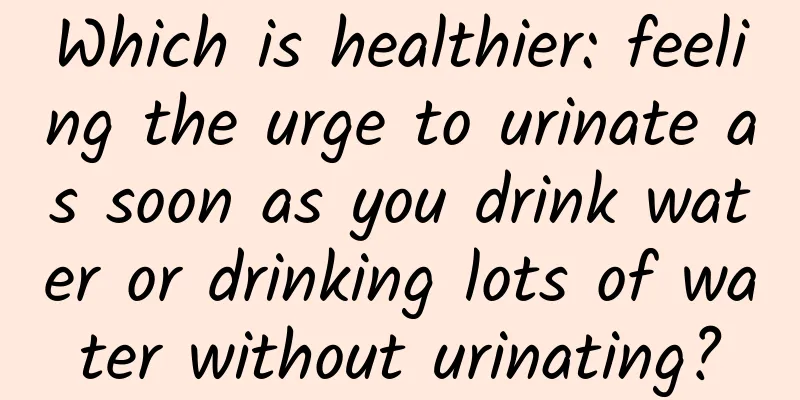Which is healthier: feeling the urge to urinate as soon as you drink water or drinking lots of water without urinating?

|
Author: Zhang Yu, researcher at Chinese Center for Disease Control and Prevention, master's supervisor Reviewer: Fu Rui, Chief Physician, Beijing Century Altar Hospital, Capital Medical University Have you ever had this experience: you feel like urinating as soon as you drink water? Some people rarely feel the urge to go to the toilet no matter how much water they drink. So, which of these two situations is healthier? In fact, drinking water and urinating are both very important and must be done in everyone's daily life. The reason why people are confused about this is mainly because they are worried about physical problems. In order to answer this question, we first need to understand the process of converting water into urine in the body. It is certain that water will not be converted into urine immediately after ingestion. It needs to go through a series of circulation and conversion in the body. Simply put, after drinking water, the first to feel the moisture are the mouth and throat, and the actual absorption process begins in the stomach, but most of the water is actually absorbed in the small intestine mucosa. Where does the absorbed water go? The answer is that it all enters the blood, becomes part of the plasma, and circulates throughout the body with the blood. When the body senses the new water, it will cause part of the water originally in the blood to be excreted through the kidneys. When this part of the water flows through the kidneys, it will first form primary urine - the initial state of urine under the action of the glomerulus, and then be repeatedly reabsorbed by the renal tubules, and finally form urine, and flow into the bladder along the ureter for storage. When we are in the bathroom, the urine is discharged smoothly, completing the entire cycle. It usually takes about 40 minutes from drinking water to urine formation. Since the water we drink will eventually be excreted from the body in the form of urine, why do we need to keep drinking water? Figure 1 Copyright image, no permission to reprint The reason is that water is essential to maintaining good health. 70% of our body weight is water, especially in plasma, which contains more than 90% water. This water plays multiple roles in the body: as a transport medium, it delivers nutrients to cells and removes metabolic waste; it maintains the balance of osmotic pressure inside and outside cells. If the osmotic pressure inside and outside cells is different, the normal morphology of cells will be destroyed; it is an indispensable basic condition for metabolism. Therefore, the saying that "water is the source of life" is not groundless. In order to maintain the balance of water in the body, we need to excrete waste water in the body through urine, sweat, digestive juices, saliva, tears, etc. At the same time, the loss of water also requires us to replenish it in time through drinking water. Otherwise, once the body lacks water, dehydration will occur. It can be said that people can go without food for a day, but they cannot go without water for a day, because severe dehydration may be life-threatening. Figure 2 Copyright image, no permission to reprint Why does urine have different shades? The depth of urine color is mainly related to the content of bilirubin metabolites in it. Normal urine is light yellow. If insufficient water intake causes urine concentration, the color will deepen. Conversely, if too much water is consumed, the color will become lighter. In addition, certain diseases (such as nephritis, urinary tract infection) or excessive intake of foods containing pigments (such as carrots, pumpkins, etc.) can also affect the color of urine. What does urine volume relate to? Urine volume is directly related to water intake. The more water a healthy person drinks, the more urine volume will naturally increase. Why do some people feel like going to the toilet after drinking water, while others don’t? Is this normal? In most cases, this is normal. As long as you drink enough water, urine production will naturally increase. In addition, the speed of water intake will also affect the speed of urine production, especially when you consume diuretic foods such as watermelon or beer, urine production will be faster. However, drinking water is not exactly the same as urinating, because we have a urine storage organ in our body - the bladder. When the urine in the bladder reaches about 300 ml, you usually feel the urge to urinate. At this time, the brain will receive a signal from the bladder, prompting us to urinate to relieve the pressure on the bladder. If we can't find a suitable place, we may choose to endure temporarily. At this time, the bladder and urethral sphincter will remain tense and resist to the end. Therefore, the urge to go to the toilet as soon as you drink water may have little to do with drinking water itself, but more to do with personal habits, bladder elasticity and tolerance. In addition, when the weather is hot or when you exercise a lot, more water is excreted in the form of sweat, which can also lead to a decrease in urine volume. However, it should be noted that long-term excessive urine retention is not a good habit, which may have an adverse effect on the health of the circulatory and urinary systems, and even cause urinary tract infections or nephritis. For the sake of health, how much water should we drink, and how do we know when we need to drink water? The Dietary Guidelines for Chinese Residents (2022) recommends: Drink enough water, in small amounts and multiple times. In mild climates, adult men with low physical activity levels should drink 1700 ml of water a day, and adult women should drink 1500 ml of water a day. Drink water actively, in small amounts and multiple times. Drink water at any time of the day, 1 cup each time, about 200 ml per cup. Drink 1 cup of water in the morning and evening, and drink a cup of water every 1 to 2 hours at other times. The recommended temperature for drinking water is 10 to 40°C. Drink water or tea, drink less or no sugary drinks, and do not replace water with drinks. When you feel thirsty or your urine output decreases, it usually means that your body is dehydrated. If you get used to drinking water at this time, it may have adverse effects on your body in the long run. We should develop a good habit of drinking water regularly to avoid holding urine. At the same time, we should not urinate too frequently. Generally speaking, urinating 5 to 7 times a day is within the normal range. In summary, whether it is "wanting to urinate as soon as you drink water" or "drinking a lot of water but not urinating", as long as the body regulates the water balance within the normal range and the daily water intake is moderate, it can be regarded as a different manifestation of health status. The key is to maintain a regular drinking habit to ensure that the body gets enough water to maintain its normal physiological functions. At the same time, pay attention to the signals sent by the body, such as persistent abnormal thirst, dark urine or difficulty urinating, which may be signs of problems with the body's water balance. You should adjust your drinking habits or seek medical attention in time. Ultimately, maintaining a balance of water in the body is the key to maintaining health. |
<<: A practical handbook for diabetes patients to control blood sugar in summer
>>: "Exercise" in the ICU promotes recovery, get moving!
Recommend
How to make a woman's small breasts bigger
A major problem that troubles women with small br...
What is the appropriate size for a boyfriend? How do I know the size of my boyfriend?
When it comes to sex life, many girls are concern...
Why do I have severe back pain before my period?
It is normal to experience breast tenderness, lac...
Garner: 80% of enterprise social business applications may not achieve the expected results
Seeing the potential of social networks in promot...
Does fruit corn have a high sugar content? What is the difference between fruit corn and ordinary corn?
Fruit corn is rich in nutrition, sweet in taste, ...
Supine chest tightness and breast cancer
Speaking of breast cancer, it is really scary for...
Yellow discharge in vagina
The vagina is one of the most important reproduct...
Why is the puppy shaking and his limbs weak? Is it normal for a puppy to lift its hind legs when running?
Many people will choose to buy a puppy and raise ...
What is the largest pyramid in Egypt? In which city are the pyramids in Egypt located?
The Egyptian pyramids are the tombs of the ancien...
How to make wolfberry rose tea
Wolfberry is a small fruit that makes us feel bea...
Can you get pregnant with seasonal amenorrhea?
Before a woman is about to experience menopause, ...
Rare! Woman pregnant with octuplets, don't use ovulation-stimulating drugs indiscriminately
recent A woman from Zhengzhou, Henan Pregnant wit...
Will my period be delayed after taking emergency contraceptive pills?
Regarding the issue of contraception, both marrie...
What causes stomach pain during menstruation?
Women's menstruation is also called the physi...









